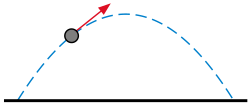Ordinary differential equation

The trajectory of a projectile launched from a cannon follows a curve determined by an ordinary differential equation that is derived from Newton's second law.
An ordinary differential equation (often shortened to ODE) is a differential equation which contains one free variable, and its derivatives. Ordinary differential equations are used for many scientific models and predictions. The term ordinary is used to differentiate them from partial differential equations, which contain more than one free variable, and their derivatives.
Numerical methods
Since ODEs have appeared in mathematics and physics, many scientists have studied methods to solve them. But unfortunately, no one could establish methods to solve any kind of ODE. Therefore, numerical methods for ODEs are widely studied since the appearance of computers.[1][2][3][4][5]
Literature
- Arnolʹd, V. I., Ordinary differential equations. Springer.
- Wolfgang Walter, Ordinary differential equations. Springer.
- Logemann, H., & Ryan, E. P. (2014). Ordinary differential equations: Analysis, qualitative theory and control. Springer.
- Hermann, M., & Saravi, M. (2014). A First Course in Ordinary Differential Equations. Analytical and Numerical Methods, Springer India.
- Chicone, C. (2006). Ordinary differential equations with applications. Springer Science & Business Media.
References
- ↑ Mitsui, T., & Shinohara, Y. (1995). Numerical analysis of ordinary differential equations and its applications. World Scientific.
- ↑ Hairer, Ernst; Nørsett, Syvert Paul; Wanner, Gerhard, Solving ordinary differential equations I-II: Berlin, New York: Springer-Verlag.
- ↑ Butcher, John C. (2008), Numerical Methods for Ordinary Differential Equations, New York: John Wiley & Sons.
- ↑ Deuflhard, P., & Bornemann, F. (2012). Scientific computing with ordinary differential equations. Springer Science & Business Media.
- ↑ Shampine, L. F. (2018). Numerical solution of ordinary differential equations. Routledge.
| The English Wikibooks has more information on: |
| Wikimedia Commons has media related to Lua error in Module:Commons_link at line 62: attempt to index field 'wikibase' (a nil value).. |